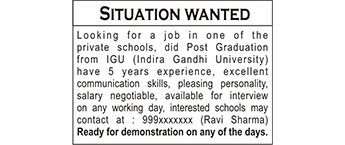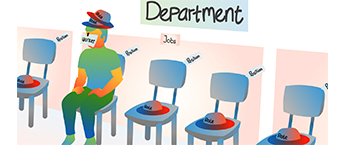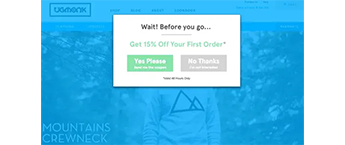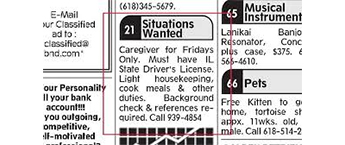What is a Situation Wanted Advertisement?
A situation wanted advertisement is when someone looking for a job takes the lead and advertises their skills or services. Unlike the usual job posting where businesses call for applications, this is the reverse. The job seeker does the talking.
These ads usually appear in the classified section of newspapers. They're written by professionals, freelancers, retired experts, consultants, or skilled workers looking for a new opportunity. From teachers to drivers to designers, these ads cover a wide range.
The goal is simple: get noticed by someone who needs help but hasn't posted a vacancy yet. Or perhaps a business owner who didn’t know they needed that kind of help until they read the advertisement situation wanted section.

A situation wanted advertisement is a short ad placed by someone looking for a job. Instead of waiting for companies to post openings, the person takes the lead and promotes their own skills. These ads are often used by job seekers, freelancers, retired professionals, or consultants who want to catch the eye of potential employers.
You’ll usually find them in the newspaper classifieds, offering services like teaching, accounting, driving, or writing. It’s a smart way to reach business owners who might be hiring or open to new talent but haven’t advertised it yet. It’s direct, simple, and often effective.
Difference Between Situation Wanted and Situation Vacant Ads
The terms can sound confusing, but the idea is simple.
- Situation Wanted: A person is looking for a job.
- Situation Vacant: A company is offering a job.
In short, one is an ad from a job seeker. The other is from an employer. Think of it as two sides of the same coin. Both appear in newspapers, both aim to connect talent with opportunities.
Benefits of Placing a Situation Wanted Advertisement in Newspapers

For job seekers, placing an ad in a newspaper might seem old school. But it’s still a strong move. Here’s why.
Wide Reach and Audience Targeting
Newspapers still land in the hands of decision-makers. Many business owners, especially in local markets or traditional industries, still rely on the print medium. A well-placed situation wanted advertisement in newspaper sections can catch the eye of someone who wasn’t even actively hiring.
Cost-Effective Advertising for Job Seekers
Compared to online portals that charge for profile boosts or premium listings, a classified ad in a local newspaper can be surprisingly affordable. It's a small price to pay for targeted visibility.
Credibility and Trust Factor of Print Media
Printed ads carry a sense of seriousness. When someone takes the effort to pay for an ad in print, it feels more genuine. It’s not lost in the noise of thousands of online profiles.
How Print Ads Complement Online Job Search
A job seeker who is active both online and offline shows initiative. It also allows them to reach a different segment—businesses that might not be hiring online or checking portals daily.
How to Write an Effective Situation Wanted Advertisement
A strong ad is all about clarity and relevance. Here’s how to write one that grabs attention and gets responses.
Clear Job Position or Role Desired

Don’t be vague. Say exactly what you’re looking for. “Experienced Sales Executive seeking a full-time role in the FMCG sector” is better than “Looking for a suitable job.”
Relevant Skills and Experience

Include your strongest points. Years of experience, special training, languages spoken, or tools you’ve worked with. Keep it crisp and specific.
Contact Information and Call-to-Action

Provide a reachable phone number or email. You can also say something like, “Available for interview this week” or “References available on request.” It shows you’re ready.
Tips for Making Your Ad Stand Out

Use simple, active language. Avoid long sentences. Mention achievements if space allows. Use words that show confidence: “Driven,” “Skilled,” and “Proven.”
Also, check your grammar. A typo in a 30-word ad stands out—for the wrong reason.
Common Mistakes to Avoid When Writing a Situation Wanted Ad
Some ads get ignored. Here’s why:
- Being too vague: “Hardworking individual seeks job” doesn’t say anything useful.
- No contact details: This happens more often than you’d think.
- Too many abbreviations: Keep it readable, not like a code.
- Overloading with buzzwords: No need to stuff every keyword. Keep it real.
- Not proofreading: A small mistake makes a big dent in credibility.
Situation Wanted Advertisement Format in Newspapers
Newspapers offer two main types of ad formats. Understanding these helps you decide what works best.
Classified Text Ads vs. Display Ads
- Text Ads are simple lines of text in a block. These are cheaper and commonly used for job-seeking ads.
- Display Ads allow visuals, logos, and better formatting. They cost more but stand out better.
Recommended Word Limit and Structure
Keep it between 20 to 40 words for a text ad. Start with your profession or title, mention key skills, and close with contact info.
Example:
“Experienced Graphic Designer seeks freelance work. Proficient in Adobe Suite, 5+ years experience. Portfolio available. Call 999xxxxxxx.”
Essential Information to Include in Your Ad
- Job role or service offered
- Years of experience
- Special skills or certifications
- Availability (full-time/part-time/freelance)
- Contact information
Situation Wanted Advertisement Examples

To help you get started, here are real-life situation-wanted advertisement examples that you can refer to.
Sample Ads for Different Job Categories
IT Professional
“Full Stack Developer with 7+ yrs experience seeks remote projects. Skilled in React, and Node.js. Available immediately. Email: devready@email.com.”
Teacher
“Qualified English Teacher (M.A. B.Ed.) seeks teaching position in CBSE school. 10 years experience. Contact: 9876xxxxxx.”
Accountant
“Senior Accountant with GST, TDS expertise seeks part-time or freelance work. 12 years experience. Call: 98xxxxxxx.”
Driver
“Experienced LMV driver with clean record seeks full-time role in Mumbai. Fluent in Hindi and Marathi. Ph: 98xxxxxxx.”
Best Practices for Designing an Eye-Catching Ad
If you're going for a display ad, make sure:
- Your name or profession is bold
- Key points are easy to skim
- There's enough white space for readability
- Use a short call-to-action like “Hire Today” or “Available Immediately”
How to Book a Situation Wanted Ad in a Newspaper
Placing the ad is easier than ever.
Step-by-Step Guide to Booking an Ad
- Choose your newspaper
- Decide between text or display format
- Draft your ad content
- Choose the ad dates (weekends work well)
- Pay and confirm
Choosing the Right Newspaper for Your Target Audience
Pick a paper that reaches the type of businesses you want to work with. Regional dailies are great for local roles. National newspapers work well for white-collar and remote jobs.
Online vs. Offline Booking – Which is Better?
Online is faster. You can preview your ad, pay instantly, and track the schedule. But offline works if you're more comfortable dealing with local agents or need help writing the ad.
Cost of Placing a Situation Wanted Advertisement in Newspapers
Here’s what affects pricing.
Factors Affecting the Cost of Situation Wanted Ads
- Newspaper circulation and popularity
- The city or region where the ad appears
- Day of the week (weekends cost more)
- Format: text ads are cheaper than display ads
Pricing Breakdown: Classified Text Ads vs. Display Ads
- Text Ads: Start around ₹300–₹600 for 20 words. Extra words cost more.
- Display Ads: Charged per square cm. Rates start around ₹150–₹500 per sq cm depending on the paper.
Cost-Saving Tips for Booking a Situation Wanted Ad
- Book in bulk for discounts
- Choose weekday slots for cheaper rates
- Use online booking platforms with promo offers
- Avoid unnecessary add-ons
Effectiveness of Situation Wanted Ads in Newspapers
Do people really get hired through these ads? Absolutely.
Success Rate of Situation Wanted Ads in Job Search
Especially in local markets, skilled trades, and freelance work, newspaper ads work well. It’s about quality over quantity—reaching people who take action.
Comparing Print Advertising with Online Job Portals
Online portals have volume. But they also have clutter. Print ads offer less competition and reach an audience that’s serious. Some businesses trust newspapers more than digital channels for finding reliable workers.
Case Studies: Real Success Stories from Situation Wanted Ads
- A retired engineer landed a consulting gig with a local firm after running a 3-line advertisement for a situation wanted in a business daily.
- A freelance content writer picked up regular work from a startup founder who saw her ad while traveling.
These aren't rare. They’re just not shouted about as much.
FAQs
In most situations wanted ads run for a single day unless you choose a longer slot. If you want more eyes on your ad, running it over a few days or weekends can help. Many people get calls after just one day, so it often works quickly.
The best newspaper depends on who you want to reach. Local papers work well for nearby jobs, while big names like the Times of India or Hindustan Times offer wider exposure. Think about where your ideal employer reads, and choose based on reach and trust.
Prices usually start at around ₹300 for basic text ads. The cost depends on how many words you use, the newspaper you choose, and the day it’s printed. Display ads cost more, but they stand out better. Some platforms also offer discounts or bundled deals
Yes, you can easily place your ad online. Many platforms let you pick a newspaper, write your ad, select dates, and pay—all in a few clicks. It saves time, avoids travel, and lets you review everything before it goes to print.
If you book early in the day, your ad can go live in the next day’s edition. Every newspaper has a cut-off time, so same-day publishing may not be possible. Online booking platforms usually show you the earliest available dates while booking.



